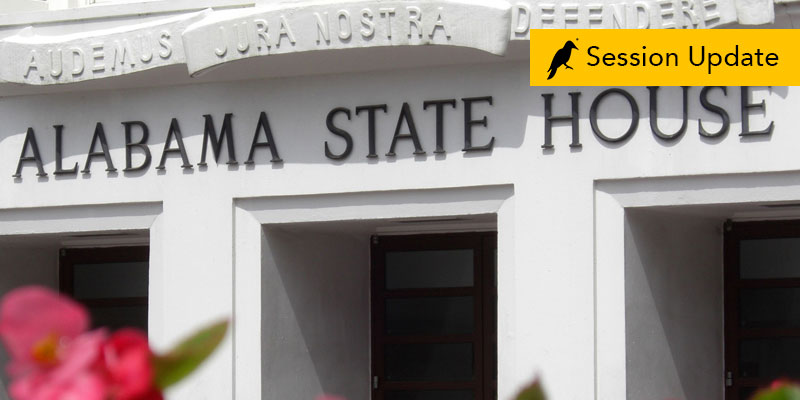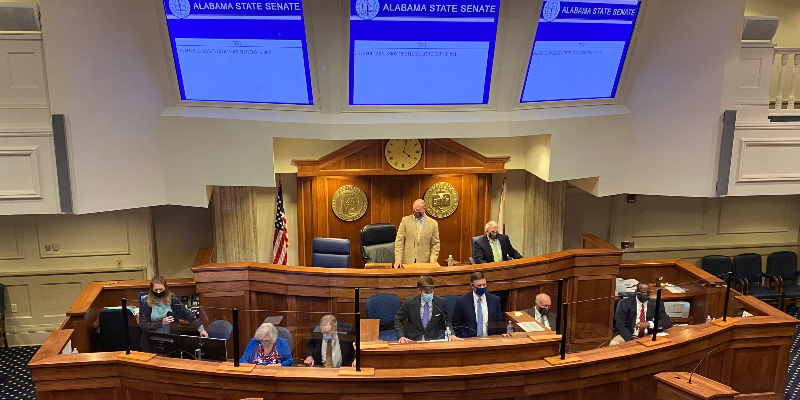MONTGOMERY — The Alabama Legislature on Wednesday met for the fifth day of its 2021 regular session.
The House convened at 1:00 p.m. and met for a brief time, mainly to open the journal for the introduction of bills and to receive committee reports. The Senate gaveled in at 4:00 p.m. and met for just under an hour.
Both chambers had extensive and hectic committee days beginning first thing in the morning.
Here is a breakdown of the day’s proceedings:
Alabama Senate
The Senate’s day kicked off with the Judiciary Committee meeting at 8:30 a.m.
Especially of note, the committee gave a favorable to Senator Arthur Orr’s (R-Decatur) SB 113, which would ensure that facial recognition or other artificial intelligence results cannot be the sole basis for an arrest.
The committee also favorable reported Senator Linda Coleman-Madison’s (D-Birmingham) SB 118, which would eliminate the application requirements for convicted felons to restore their voting rights upon complete of their sentence. A floor amendment is expected after Senator Will Barfoot (R-Pike Road) raised a concern about the language of the bill allowing this restoration to occur before all fines and fees are paid to the court pursuant to an individual’s sentence. Coleman-Madison seemed to indicate this would be a friendly amendment.
Senate Judiciary subsequently gave a favorable report to Senator Rodger Smitherman’s (D-Birmingham) SB 158 related to improving the hiring practices of law enforcement agencies. Finally, the committee advanced Orr’s SB 210, the civil asset forfeiture reform bill he has brought previously.
All eyes were on the Senate Tourism Committee later in the morning.
First, SB 138, Senator Jabo Waggoner’s (R-Vestavia) direct wine shipment bill was given a favorable report, with Waggoner’s assurance he would work with Senate Minority Leader Bobby Singleton (D-Greensboro) on attempting to consolidate a competing bill by Singleton.
SB 167 was also given a favorable report, as was SB 88. Sponsored by Senator Andrew Jones (R-Centre), SB 167 relates to wine festivals; SB 88 by Smitherman allows Class 1 municipalities to have up to 15 entertainment districts.
One of the session’s most highly anticipated moments came when Senator Del Marsh (R-Anniston), chairman of the committee, introduced his comprehensive gaming bill on Tuesday evening. SB 214 came before the committee the next day and received a unanimous favorable report after a public hearing and discussion among the committee members. Read more about that here.
However, another important bill by Marsh followed right behind the gaming legislation. SB 215 would create the Alabama Digital Expansion Authority to oversee the expansion and availability of high-speed broadband services throughout the state.
Two amendments were tacked onto SB 215 on Wednesday before the bill received a favorable report. One of the amendments increased the number of universities that would be a part of the Alabama University Research Alliance, which would created by the bill.
At noon, the Senate Health Committee met; among other items, the committee gave a favorable report to Senator Shay Shelnutt’s (R-Trussville) Vulnerable Child Compassion and Protection Act, SB 10.
While that bill always draws significant controversy, it was Senate Education Policy later in the afternoon that really saw some sparks fly. Read about that here.
The Senate gave final passage to two priority bills of legislative leadership and Governor Kay Ivey after they convened on Wednesday: HBs 170 and 192.
Carried by Senator Dan Roberts (R-Mountain Brook) in the Senate, HB 170, among other tax reform measures, would ensure that federal stimulus funds derived from the CARES Act and subsequent coronavirus relief legislation are not subject to state income taxes.
HB 192 would renew and improve job creation incentives found in the Alabama Jobs Act and Growing Alabama Act. That bill was carried by Senate Pro Tem Greg Reed (R-Jasper) in the Senate.
A press conference will be held by legislative leadership on Wednesday regarding the passage of HB 192 specifically.
“As one of the first bills to pass this session, this legislation sends a strong message that Senator Greg Reed’s priority as the new Pro Tem is to move Alabama forward,” Governor Kay Ivey stated of the bill on Wednesday following Senate passage. “I applaud Senator Reed, members of the Alabama Senate, and Chairman Bill Poole, who led this effort in the House, for the significant action today to ensure we can recruit and retain good-paying jobs on behalf of the people of Alabama.”
View the full list of the Senate’s floor activity from the day here, including which bills were advanced from committee and received a second reading.
Alabama House
The lower chamber’s day was kickstarted at 8:30 a.m. by the Urban and Rural Development Committee giving a favorable report to Orr’s SB 76 and Representative Rod Scott’s (D-Fairfield) HB 215. These companion small cell bills are related to the deployment of 5G infrastructure in the state.
Later in the day, House Education Policy gave a favorable report to Representative Pebblin Warren’s (D-Tuskegee) HB 208 as substituted. The substitute version of the bill approved by the committee would mandate that in order for an eligible-age student to enter the first grade, either kindergarten must be successfully completed or “first grade readiness on a district approved assessment” must be demonstrated.
During a lengthy House Judiciary meeting, one highlight was the advancement of SB 30, the “safe harbor” bill by Orr that is designed to protect businesses and other entities from frivolous coronavirus lawsuits.
View the full list of the House’s floor activity from the day here, including which bills were advanced from committee and received a second reading.
Looking ahead
The main item of note on the House floor on Thursday will be SB 30; the bill is expected to end up on Ivey’s desk by the afternoon.
Over in the Senate, the body will debate SB 214, the gaming bill, however a vote is not expected on the legislation until after the legislature’s one-week break.
The Senate is scheduled to convene at 9:30 a.m., while the House gets in 30 minutes later.
Livestreams of legislative proceedings can be viewed on the legislature’s website here.
Sean Ross is the editor of Yellowhammer News. You can follow him on Twitter @sean_yhn







